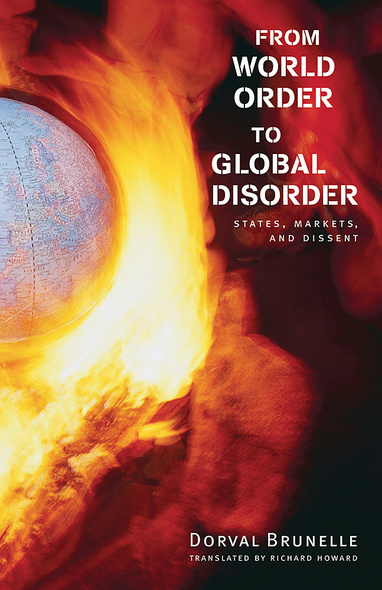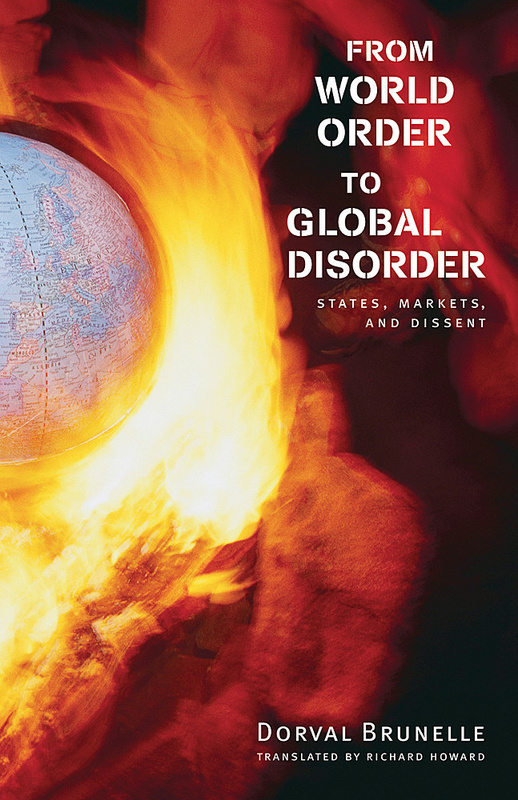
From World Order to Global Disorder
States, Markets, and Dissent
Anti-globalization activism world-wide attests to the tensionsbetween globalization and civil society. To better understand thisfraught relationship, Dorval Brunelle compares two social ordersseparated by a half-century. The post-World War II order entailed abroad vision uniting three complementary objectives – security,justice, and welfare – which were entrusted to a network ofinternational and national institutions. In contrast, globalization,with wealth as its only objective, is undermining and overhauling thevalues and institutions of the previous order, including the UnitedNations and the welfare state.
From World Order to Global Disorder demonstrates theprofound effect of globalization on relations between the state, civilsociety, and markets, as well as on collective and individual rights.As neo-liberalism evolves into globalization, governments are eschewingtheir role as public guardians and are instead bartering the veryassets and resources their citizens’ labour and activism createdand preserved. However, no constitution makes governments owners ofcollective assets: governments are merely trustees. In this context,the world’s citizens have a tremendous task before them: in thewake of the welfare state, their social forums are indispensable in thequest for a more just and equitable world.
The authoritative account of the rise of the global social justice movement by an ‘insider,’ who also happens to be one of Canada’s leading social scientists. Dorval Brunelle’s book will be of interest to political scientists, economists, sociologists, and citizens with an appetite to discover what lies behind the headlines about lost jobs, world trade talks, growing inequalities, and popular unrest in much of the world.
The French philosopher and activist, Jean Rostand, said: ‘It is horrible to see everything one detested in the past coming back wearing the colours of the future.’ Dorval Brunelle’s wonderful new book explains how economic globalization has erased the international consensus for justice that emerged out of the horrors of World War II and exposes this new system for the regressive force it really is.
... the issues that Brunelle tackles in this book are vast, complex, and impossible to resolve. ... The author does an admirable job of theorizing some of these issues. The book’s theme consists of nothing less than the evolution of the global economy since the closing of the Second World War and he posits some novel and interesting connections on how this behemoth has changed over the past two decades. ... In short, this volume provides an important overview of the global political economy and where it is heading in the first decade of the twenty-first century.
In this important book, Dorval Brunelle revisits the post–Second World War international order and finds that its foundational principles are as valid today as they were then. He concludes that efforts to reform international institutions cannot address the global democratic deficit, and advises civil society that the only public space within which they can effectively challenge globalization is national. This book deserves a wide international readership.
Dorval Brunelle is Professor of Sociology andDirector of the Observatoire des Amériques at the Université du Québecà Montréal (UQAM). He has published extensively, focusing more recentlyon the social dimensions of globalization and market liberalization.Richard Howard has been translating books from theFrench, chiefly in the social sciences, for over three decades.
Abbreviations; Preface; Introduction
1 Building the Postwar Order
2 Welfare States and Social Rights
3 Internationalism versus Regionalism in the Cold War
4 Canada and the Cold War: The Shift to Regionalism
5 Canada-US Free Trade: From the Regional to the Global
6 Features of a Global Order
7 Consultation or Contention: Social Movements and Globalization
Conclusion
Notes; Bibliography; Index




